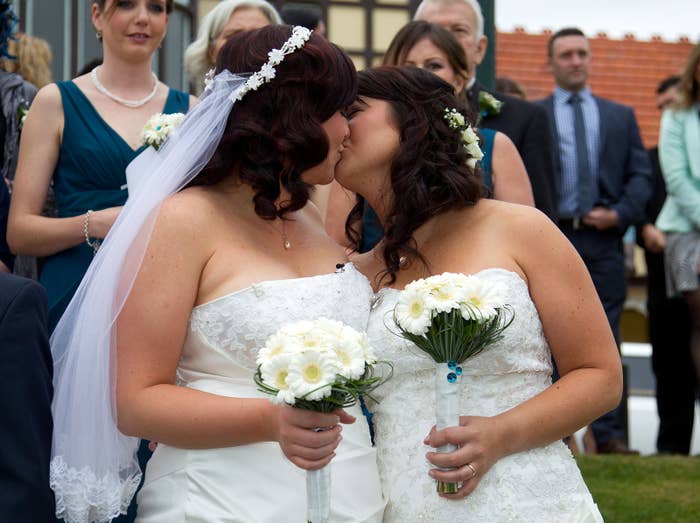
Gay couples have been singled out in a controversial same-sex marriage bill because a large number of Australians want to deny them services, says the Liberal senator behind the proposed legislation.
James Paterson, a senator for Victoria, released the legislation on Monday ahead of a result in Australia's national survey on same-sex marriage on Wednesday.
The bill quickly attracted the ire of legal experts and LGBT rights advocates, who say the broad right to deny goods and services to same-sex couples for their weddings is a significant rollback of anti-discrimination law.
Some, including Labor MP Tim Watts, have criticised Paterson for targeting gay couples, pointing out the inconsistency of granting exemptions for same-sex weddings, but not other marriages people may dislike for religious or secular reasons – for instance interracial or interfaith marriages, or divorcees re-marrying.
Paterson said it was simply a "practical or pragmatic" decision.
"The only significant issue in which a large proportion of the community are calling for these sorts of protections is on the issue of same-sex marriage," he told BuzzFeed News. "I’ve never heard anyone call for exemptions other than these."
"We’ll find out on Wednesday how many people vote 'no'; my guess would be 30, maybe 40% of people. That's a pretty significant proportion of our fellow Australians and I think their right to have their own belief should be protected."
Paterson, who supports same-sex marriage, rejected the idea that opposition to divorcees marrying — a position held by the Catholic Church — has community support.
"I’m coming to this as focused as possible and not weighing into other areas where there is not a community expectation that it be changed ... Unless I see really strong evidence for it, I’m pretty sceptical that it’s necessary."
President of the Law Council of Australia, Fiona McLeod, slammed the bill as an "extraordinary and perilous" winding back of anti-discrimination law.
"The bill would allow people to refuse to provide goods and services on the grounds of belief, thought and conscience, taking us well beyond religious beliefs into unchartered waters," she said.
Freedom from discrimination is a fundamental human right, McLeod said.
"The right to freedom of religion also appears in international law. While the freedom to have religious beliefs is also protected unconditionally, the manifestation or expression of those beliefs or religion may be subject to limitation where it impacts upon other fundamental rights."

The Paterson bill also includes an "anti-detriment clause" that would protect a number of beliefs under the law — including the view that marriage is solely between a man and a woman; that sex should only be between a married man and woman; that gender is binary; and even the view that same-sex relationships are immoral or wrong.
The bill would enshrine a right to hold, express and act on those beliefs, and override any state or territory laws that infringe on those beliefs in order to prevent discrimination against LGBTI people.
Anna Brown, director of legal advocacy at the Human Rights Law Centre, described the mechanism as "bizarre".
"It provides immunity to anyone with a particular view on marriage, not just same-sex marriage but all sorts of ideas about marriage, family and gender described as ‘traditional’," she told BuzzFeed News.
"This clause is being used to punch a hole in discrimination law and create immunities against legal claims for people holding these views. For example, a maternal child care worker contracted by a local council would be able to say to a single mother that they were damaging their child by raising it without a father [and] would not be able to be disciplined by the council."
Paterson said the reason the anti-detriment clause extended to views about parenting, sexuality and gender identity was to make sure people could explain the reasons behind their anti-same-sex marriage views.
Under the clause, people have a legal protection if they "intimidate or humiliate" people on the basis of their sexuality or gender identity, but cannot "threaten or harass".
"The line has to be drawn somewhere," Paterson said. "We’ve had a very similar debate recently, federally, on [section] 18C [of the Racial Discrimination Act] ... It’s a safeguard to make sure you can’t say anything you like, it’s a limitation and we think it’s reasonable one."
Paterson said he has "no guarantee or expectation" that hardline conservatives in his party including Eric Abetz and Andrew Hastie will support the bill in the event of a "yes" vote in the survey.
"My hope is they would vote for it, because I think this is the best chance they will ever have to protect the freedoms that they say and have said during the campaign that they care about," he said.
"I think there are aspects of this bill conservatives won’t like. The anti-detriment provision is much more narrow than what the Coalition for Marriage has called for, for example. It only applies to governments and government agencies, it doesn’t apply to the private sector."
Paterson said he had spoken "briefly" to senator Dean Smith, and the pair had agreed to sit down and discuss the "best path forward" and whether there is any common ground between the bills.
The Smith bill, which has gained the support of Labor and The Equality Campaign, provides a narrower set of exemptions in relation to marriage celebrants and religious organisations alone.
Smith declined to comment on the Paterson bill.

